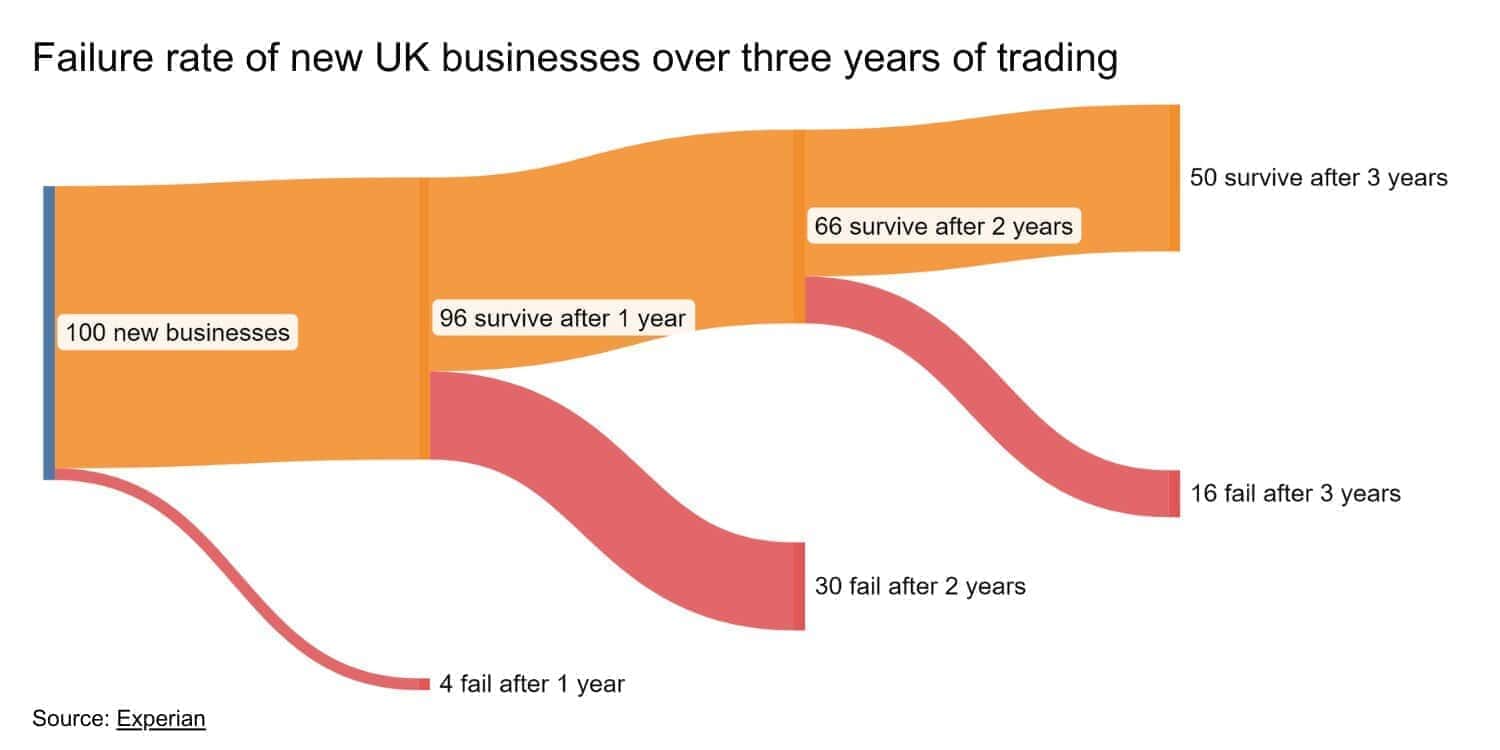The early stages of running a business are some of the most memorable, rewarding, and challenging times for entrepreneurs.
It’s when you test your initial ideas, overcome financial pressures, and face the frightening reality of selling your product or service to people who don’t know who you are. While navigating these early years is no small feat, it’s also an opportunity to build strong foundations to support the business for years to come.
Key takeaways
- Establish a detailed business plan to guide your objectives and attract potential investors from the start.
- Adapt your strategies based on customer feedback to refine your offerings and improve satisfaction.
- Assess your business’s health regularly to identify weaknesses and plan for sustainable growth and future expansion.
Getting the first three years right is crucial if you plan to run your business long-term. That’s because it’s surprisingly common for new businesses in the UK to fail in these initial years.
According to Experian’s analysis of business closure rates from 2013-2022, around 4% of new businesses cease trading by the end of their first year of operations. That failure rate rises to more than 34% by the end of the second and to 50% within three years of opening.
In other words, of 100 businesses that open in a year, 96 will continue to run after the first year, only 66 will survive after the second, and then just 50 of the original 100 will remain operational by the end of the third.

Year one: build a solid foundation
The failure rate after a business’s first year is relatively low at 4%, so your chances are good when starting out.
However, don’t let that statistic stop you from making sound, logical decisions. The reason startups fail in these early stages is typically due to ineffective leaders. That includes a lack of relevant knowledge and an unwillingness to adjust personal behaviour or business processes.
- Starting a family business: 8 tips for success
- How to overcome the fear of starting your own business
- Company dissolution vs. liquidation – what’s the difference?
So, a good attitude and desire to learn are essential to your business’s overall health and longevity. Your first year will be filled with trial and error as you try everything for the first time. Don’t be afraid to pivot your strategies based on how things work out.
What to focus on in your business’s first year:
Create a business plan: It’s essential to write a business plan that thoroughly maps your company’s objectives to help you stay on track. It should include information about your target market and how much you project to spend and earn. A solid business plan will also help you attract investors.
Register your company: For tax efficiency, limited liability, improved brand credibility, and ease of raising capital, consider registering your business as a limited company. Turn to a trusted company formation agent for help with the incorporation process.
Manage finances: Recording your cash flow is essential. Many startups fail due to poor financial management, so create budgets and track all your business expenses and overheads. Accountancy software like QuickBooks can save you time and reduce human errors. Or, if you want more technical support, you could seek the help of an accountant.
Customer acquisition: One of the most critical areas to focus on. Identify your target audience and determine how to convince them to buy your product or service. In this early stage, you could consider quick wins, like posting ads on social media.
Set up a website: Buy a domain and build a professional website. Tools like Wix and Squarespace can make this quick and affordable. Also, reserve your business’s username on various social media channels. Even if you don’t have time to create regular content now, it’s good to have it for when you need it later down the line.
Build your online presence: It is essential to get your website ranked organically for the vital keyword phrases in your sector on search engines like Google and Bing. If you have a brick-and-mortar storefront, make sure your business is visible on Google Maps so local customers can easily find you and your opening hours. Encouraging customers to leave reviews is also essential, as it will help new customers discover you and trust your new business.
Year two: adapt as you go
Many businesses start to fail in the second year. Dwindling funding, cashflow issues, and depleting consumer interest are all risks to watch at this stage.
However, the good news is, by now, you should have a clearer idea of what’s working and what’s not. This is the time to refine your offerings, strengthen your brand, and expand your customer base.
What to focus on in your business’s second year:
Improve your product or service: Use customer feedback and reviews from your first year to refine your business offerings. This could mean improving the quality of your products, adding new features to your services, or adjusting your pricing strategy.
Expand your marketing efforts: Try new marketing channels and strategies to reach a wider audience. This could include improving your website’s search engine optimisation (SEO), creating social media adverts, collaborating with influencers, or establishing partnerships with complementary businesses.
Incentivise customer loyalty: Retaining existing customers is far cheaper than finding new ones, so keeping loyal customers happy is invaluable for long-term success. Consider implementing a loyalty scheme, personalised discounts, or a referral programme to encourage repeat business.
Scale operations: As you grow, you may want to hire staff, but you’ll have to calculate whether it’s affordable. Outsourcing tasks like customer service may be more cost-effective to free up your time.
Year three: plan for the future
If you’ve prepared well, your business should have gained stability by your third year of trading. Hopefully, your customer base is steadily growing, and you’ve gained some consistent revenue streams.
Therefore, your third year is the time to focus on sustainability and scalability. Start planning your longer-term goals based on what you’ve achieved so far.
What to focus on in your business’s third year:
Assess your business’s health: Analyse your financials, check customer satisfaction levels, and ensure your business processes are efficient. This will help you identify weaknesses and make informed decisions about where to focus your efforts for sustainable growth.
Further expand your product or service line: If your core offering is performing well, consider expanding into new products or services that complement your existing line. Ensure that any new ideas are backed by solid research and an apparent demand.
Invest in your brand: Strong branding is crucial for long-term success. Ensure your brand’s design and tone of voice are consistent across all channels. It may be worth investing in professional design and marketing expertise to enhance your company’s image.
Explore new markets: If your local market is saturated, it might be time to explore opportunities in new regions or consider international expansion. This could involve researching different markets, sourcing manufacturers or distributors abroad, or setting up a separate website for customers overseas.
Plan for future growth: With three years under your belt, it’s time to start thinking about the next steps. Do you want to expand to new locations, or even prepare for an eventual exit strategy? Create a new medium-term business plan based on what you’ve achieved so far.
Prepare well and enjoy the journey
Successfully navigating the first three years of a new business is a significant achievement. By setting solid foundations, adapting as you go, and planning for the future, you’ll be in a solid position to push past this critical period that trips up so many others.
With persistence, you’ll set yourself up for long-term success and watch your business thrive beyond its first few years.














Join The Discussion
Comments (2)
Excellent article! These business navigation tips will be helpful in my own financial services UK business.
Thank you for your kind comment!
We are so glad you enjoyed our recent blog.
Kind regards,
The QCF Team